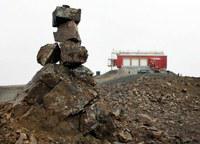Canada is missing a consistent strategy for supporting climate science – a shortcoming that is driving researchers from the field and depriving policy-makers of information as they grapple with the anticipated effects of global warming, a new report concludes.
Among other consequences, the result is that Canada’s premier laboratory for atmospheric research in the high Arctic faces shuttering for the second time in two years, owing to the lack of a stable funding mechanism for keeping the facility running.
The report, released Wednesday by the research advocacy group Evidence for Democracy, underscores the absence of a federal funding program specifically tailored for climate studies that require long-term monitoring, infrastructure and collaboration beyond the scope of what an individual scientist working with students can accomplish.
Based on a detailed survey of 87 climate scientists, and in-depth interviews with a smaller number of research leaders, the report does not suggest that the Trudeau government is antagonistic toward climate research, but rather that its approach has made funding for fundamental climate science difficult to access.
“This government has been having a hard time getting the pots of money right,” said Katie Gibbs, the organization’s executive director. “There’s a need for more strategic thinking on how to make sure we are doing this essential research.”
As one example, she noted that the Natural Sciences and Engineering Research Council, a federal funding agency, has a program stream called Advancing Climate Change Science in Canada, but on closer inspection, the terms of the program are specific to cooling technologies, forest ecology and carbon sinks. The program is not intended to fund research on the atmosphere and related systems that are specifically about the “climate” part of climate change.
The report suggests that what is needed is a program that will fund intermediate-scale projects with budgets of about $1-million to $2-million a year. That would encompass work done by networks of climate researchers and – crucially – support work and research infrastructure in the high Arctic that is too expensive to fund with a single research grant, but critically important for understanding the impact of climate change in a Canada.
In particular, this includes the Polar Experimental Atmospheric Research Laboratory – known as PEARL. Based at Eureka, on Ellesmere Island, the university-run lab monitors ozone, greenhouse gases and other climate-change-related constituents of the Arctic atmosphere among other research projects.
PEARL’s current tranche of federal funding runs out at the end of September. Kimberly Strong, an atmospheric scientist at the University of Toronto and deputy principal investigator for the lab, said that by stretching what’s left and drawing on other sources PEARL should be able to continue gathering data until the end of March.
"At that point, if nothing comes through, we’ll be in the situation where we’d have to close PEARL,” she said.
The lab faced an identical situation in the summer of 2017, until federal Science Minister Kirsty Duncan announced a funding extension to 2019.
A spokesperson for the minister said that researchers understood then that this extension, “did not represent a long-term solution and any additional support would have to be obtained through existing programs.”
She added that Environment and Climate Change Canada will continue to keep the laboratory building open, which is federal property, for researchers who can find funding.
The challenge is that, to be effective, researchers tracking the long-term effects of climate change need a more predictable funding model said Paul Kushner, president of the Canadian Meteorological and Oceanographic Society, the professional association that represents climate scientists in Canada.
PEARL and other climate-science programs were formerly funded by a model that many scientists regarded as successful, but which the Harper government eliminated in 2012. Its five-year replacement was allowed to expire by the current government in 2017.
“If we can’t move past this point, Canada stands to lose its best and brightest climate scientists and its ability to provide accurate and reliable information to individuals and communities,” Dr. Kushner said.
The full report can be found here:
https://evidencefordemocracy.ca/en/content/survey-climate-scientists-reveals-lack-strategic-investment-field

